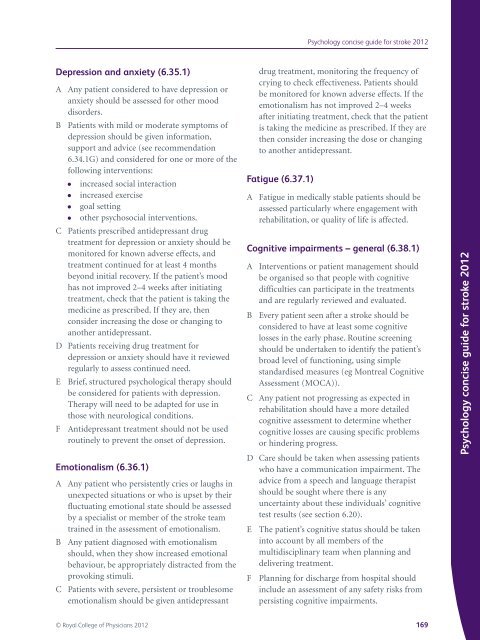national-clinical-guidelines-for-stroke-fourth-edition
national-clinical-guidelines-for-stroke-fourth-edition
national-clinical-guidelines-for-stroke-fourth-edition
Create successful ePaper yourself
Turn your PDF publications into a flip-book with our unique Google optimized e-Paper software.
Depression and anxiety (6.35.1)<br />
A Any patient considered to have depression or<br />
anxiety should be assessed <strong>for</strong> other mood<br />
disorders.<br />
B Patients with mild or moderate symptoms of<br />
depression should be given in<strong>for</strong>mation,<br />
support and advice (see recommendation<br />
6.34.1G) and considered <strong>for</strong> one or more of the<br />
following interventions:<br />
● increased social interaction<br />
● increased exercise<br />
● goal setting<br />
● other psychosocial interventions.<br />
C Patients prescribed antidepressant drug<br />
treatment <strong>for</strong> depression or anxiety should be<br />
monitored <strong>for</strong> known adverse effects, and<br />
treatment continued <strong>for</strong> at least 4 months<br />
beyond initial recovery. If the patient’s mood<br />
has not improved 2–4 weeks after initiating<br />
treatment, check that the patient is taking the<br />
medicine as prescribed. If they are, then<br />
consider increasing the dose or changing to<br />
another antidepressant.<br />
D Patients receiving drug treatment <strong>for</strong><br />
depression or anxiety should have it reviewed<br />
regularly to assess continued need.<br />
E Brief, structured psychological therapy should<br />
be considered <strong>for</strong> patients with depression.<br />
Therapy will need to be adapted <strong>for</strong> use in<br />
those with neurological conditions.<br />
F Antidepressant treatment should not be used<br />
routinely to prevent the onset of depression.<br />
Emotionalism (6.36.1)<br />
A Any patient who persistently cries or laughs in<br />
unexpected situations or who is upset by their<br />
fluctuating emotional state should be assessed<br />
by a specialist or member of the <strong>stroke</strong> team<br />
trained in the assessment of emotionalism.<br />
B Any patient diagnosed with emotionalism<br />
should, when they show increased emotional<br />
behaviour, be appropriately distracted from the<br />
provoking stimuli.<br />
C Patients with severe, persistent or troublesome<br />
emotionalism should be given antidepressant<br />
drug treatment, monitoring the frequency of<br />
crying to check effectiveness. Patients should<br />
be monitored <strong>for</strong> known adverse effects. If the<br />
emotionalism has not improved 2–4 weeks<br />
after initiating treatment, check that the patient<br />
is taking the medicine as prescribed. If they are<br />
then consider increasing the dose or changing<br />
to another antidepressant.<br />
Fatigue (6.37.1)<br />
Psychology concise guide <strong>for</strong> <strong>stroke</strong> 2012<br />
A Fatigue in medically stable patients should be<br />
assessed particularly where engagement with<br />
rehabilitation, or quality of life is affected.<br />
Cognitive impairments – general (6.38.1)<br />
A Interventions or patient management should<br />
be organised so that people with cognitive<br />
difficulties can participate in the treatments<br />
and are regularly reviewed and evaluated.<br />
B Every patient seen after a <strong>stroke</strong> should be<br />
considered to have at least some cognitive<br />
losses in the early phase. Routine screening<br />
should be undertaken to identify the patient’s<br />
broad level of functioning, using simple<br />
standardised measures (eg Montreal Cognitive<br />
Assessment (MOCA)).<br />
C Any patient not progressing as expected in<br />
rehabilitation should have a more detailed<br />
cognitive assessment to determine whether<br />
cognitive losses are causing specific problems<br />
or hindering progress.<br />
D Care should be taken when assessing patients<br />
who have a communication impairment. The<br />
advice from a speech and language therapist<br />
should be sought where there is any<br />
uncertainty about these individuals’ cognitive<br />
test results (see section 6.20).<br />
E The patient’s cognitive status should be taken<br />
into account by all members of the<br />
multidisciplinary team when planning and<br />
delivering treatment.<br />
F Planning <strong>for</strong> discharge from hospital should<br />
include an assessment of any safety risks from<br />
persisting cognitive impairments.<br />
© Royal College of Physicians 2012 169<br />
Psychology concise guide <strong>for</strong> <strong>stroke</strong> 2012


